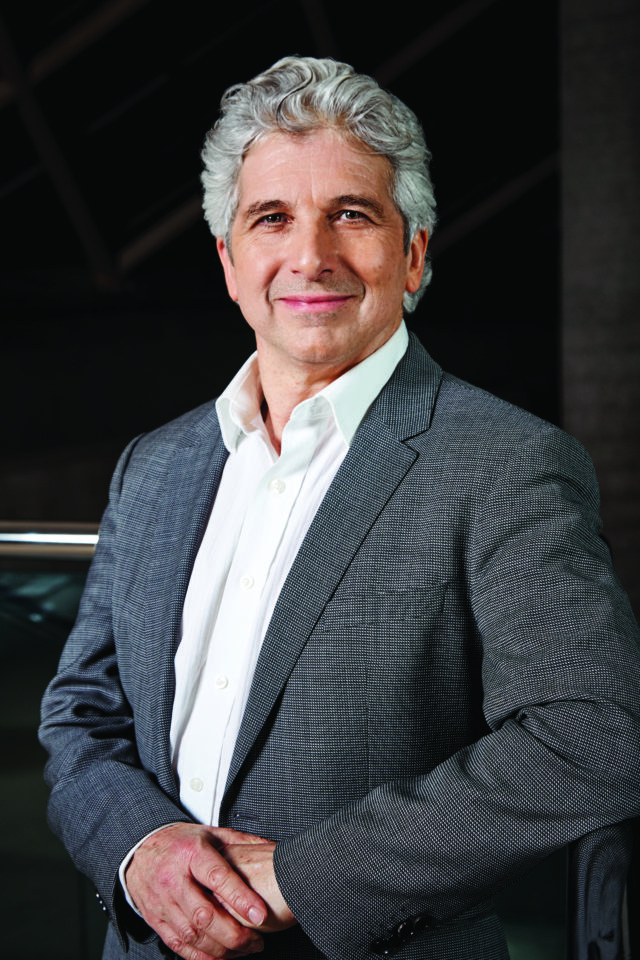
Violinist/conductor Peter Oundjian served as artistic advisor of the Colorado Music Festival (CMF) for the 2018 season, a position halfway between giving advice and being responsible for the season’s programming. He conducted three of the six weeks of orchestral concerts and invited some of the guest artists, in a season that featured works by American composers.
Now, he has been appointed the CMF’s fourth-ever music director, making 2019, in a way, “his” festival. “I guess you’re right,” he says thoughtfully about that observation, and then goes on to talk in general terms about what he would like CMF to be under his direction.
“A festival should be a celebration,” he says. “I want it to be really dynamic, really exciting, with artists from all over the world, making concerts really appealing and building larger audiences.”
He is still conducting about half of the orchestral concerts, but he has shaped the programming of the entire 2019 festival and given the orchestra series an explicit theme. In anticipation of the 250th anniversary of Beethoven’s birth in 2020, the 2019 season is an exploration of Beethoven’s influence on music that came after him, from the 19th through the 20th centuries.
If Beethoven seems a conventional starting point for a classical music festival, Oundjian doesn’t deny it, but he is quick to point out, “There’s not much Beethoven on the program! The subject is Beethoven, but it’s Beethoven’s path to the future.”
That means that programs will feature music reflecting the ways Beethoven’s music pointed to later styles. For example, the opening night concert, titled “Beethoven’s Path to Romanticism,” features Beethoven’s Overture to Egmont, followed by stylistically Romantic works that were influenced by Beethoven’s example: Verdi’s Overture to La Forza del destino, Rachmaninoff’s Second Piano Concerto with pianist Natasha Paremski, and Respighi’s Pini di Roma (Pines of Rome).
Other orchestral concerts have similar design: a work by Beethoven sharing the program with works reflecting Beethoven’s influence. “Beethoven’s Path to Modernism” on June 30 features the Grosse fuge (Great fugue) for string quartet, a work so in advance of its time that Stravinsky once said it would always be modern, alongside works by Berlioz, Mendelssohn and Richard Strauss.
On July 14, “Beethoven’s Path to Neo-Classicism” will feature the Haydn-esque Symphony No. 1 on the same program with early 20th-century neo-classical works by Stravinsky and Prokofiev. And “Beethoven’s Path to Minimalism” on Aug. 1 pairs the “Pastoral” Symphony with Philip Glass’ Violin Concerto No. 1 from 1987, played by Robert McDuffie.
“The whole idea,” Oundjian says, is to ask “was Beethoven actually a classical composer? What is he? I think that if you assume that people aren’t prepared to challenge their imaginations, you’re letting them down in a way. Give people an opportunity to see underneath the surface of things.”
The theme of Beethoven’s influence is found outside the concerts that have “Beethoven’s Path” in the title. “We’re doing a lot of pieces that are related to Beethoven,” he says, listing Berlioz Symphonie Fantastique, written only three years after Beethoven’s death, on a concert to be performed twice July 25 and 26; and Mahler’s Third Symphony, the last movement of which reflects Beethoven’s final string quartet, on the Festival Finale concert Aug. 3.
Oundjian’s other theme is, if anything, more conventional than Beethoven’s ongoing influence. “We’ve also started a mini-Mozart festival,” he says. “I did a lot of different festivals in Toronto, and people would come to the new creations festival, and they would come to the Mozart festival and they would love both. So it’s a balance.
“I don’t deny the programming is little bit safer than last year, and than it will be going forward. This season is about consolidating things and preparing for next season that’s going to be much more daring. We’ll have a mini-festival of living composers within the festival, starting in 2020.”
In other words, Oundjian doesn’t want people to judge his vision of the CMF from this one season. “People love to reach conclusions without full evaluation,” he says. “[We will be] getting new works commissioned, dedicating ourselves to new music, particularly from the U.S.”
Beyond that, he won’t — or can’t — tell you what the future will bring. “I never like to be rigid about visions,” he says. “Each season has a new vision, and you plan a season a year and a half ahead. I don’t know in two years what I will want to do a year and a half after that!
”When somebody says ‘What is your goal for the next five years?’ I say, ‘I’m not telling you!’ I don’t even know myself yet.”
ON THE BILL: The full summer schedule and ticket information for the 2019 Colorado Music Festival may be found at coloradomusicfestival.org/festival/














